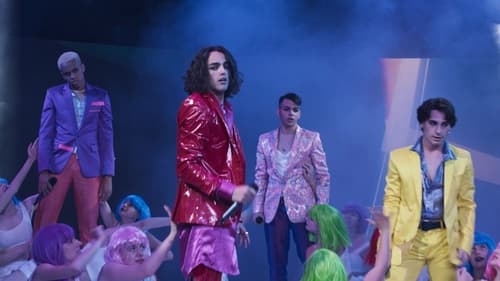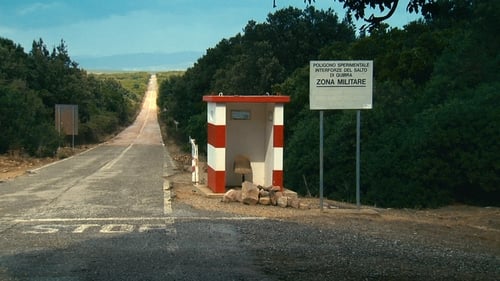Martina Parenti
Nacimiento : 1972-07-28, Milano, Italy

Martina
Students at an academy of singing, dance, and music are subjected to strict rules and arduous challenges in an atmosphere of fierce rivalry as they pursue the dream of becoming show business stars. The clandestine relationship of Lisa and Damiano is likely to cost them the opportunity to participate in the final contest and will have to decide whether to sacrifice love to achieve success.

Director
In a room of the Cineteca di Milano, Giancarlo Consonni and Graziella Tonon observe old films that have just been digitized: they tell of the life and projects of the architect, urban planner, painter and photographer Piero Bottoni. The film follows the couple's research among the materials stored both in the film library and above all in the archive. They tell of a multifaceted and socially committed artist, who has dedicated his life and his work to the primary intent of instilling dream and enchantment into reality, making use of the contribution of all the arts. Through the multiplicity of materials at our disposal - drawings, films, photos, surveys, projects, voices - the film shows the realization of Piero Bottoni's most ambitious project: the construction of a mountain in Milan, Monte Stella, born from the rubble of the Second World War.

Producer
Hace años ya que Farocki nos invitó a desconfiar de las imágenes, y que Rivette nos alertó de la abyección de un travelín. Este film recoge ese espíritu en un inteligente y esclarecedor recuento de quién produce (y cómo) las imágenes de la guerra. Empezando por la mirada colonialista de los archivos de la invasión de Italia a Libia en 1911, siguiendo por la actual pluralidad y sobrecarga de imágenes del mundo por cuenta de smartphones y cámaras de seguridad, para recalar en una “escuela de cine” y archivo audiovisual militar (quizás la parte más fascinante del film) y sus lecciones de cómo registrar y contar un conflicto.

Sound
Hace años ya que Farocki nos invitó a desconfiar de las imágenes, y que Rivette nos alertó de la abyección de un travelín. Este film recoge ese espíritu en un inteligente y esclarecedor recuento de quién produce (y cómo) las imágenes de la guerra. Empezando por la mirada colonialista de los archivos de la invasión de Italia a Libia en 1911, siguiendo por la actual pluralidad y sobrecarga de imágenes del mundo por cuenta de smartphones y cámaras de seguridad, para recalar en una “escuela de cine” y archivo audiovisual militar (quizás la parte más fascinante del film) y sus lecciones de cómo registrar y contar un conflicto.

Editor
Hace años ya que Farocki nos invitó a desconfiar de las imágenes, y que Rivette nos alertó de la abyección de un travelín. Este film recoge ese espíritu en un inteligente y esclarecedor recuento de quién produce (y cómo) las imágenes de la guerra. Empezando por la mirada colonialista de los archivos de la invasión de Italia a Libia en 1911, siguiendo por la actual pluralidad y sobrecarga de imágenes del mundo por cuenta de smartphones y cámaras de seguridad, para recalar en una “escuela de cine” y archivo audiovisual militar (quizás la parte más fascinante del film) y sus lecciones de cómo registrar y contar un conflicto.

Screenplay
Hace años ya que Farocki nos invitó a desconfiar de las imágenes, y que Rivette nos alertó de la abyección de un travelín. Este film recoge ese espíritu en un inteligente y esclarecedor recuento de quién produce (y cómo) las imágenes de la guerra. Empezando por la mirada colonialista de los archivos de la invasión de Italia a Libia en 1911, siguiendo por la actual pluralidad y sobrecarga de imágenes del mundo por cuenta de smartphones y cámaras de seguridad, para recalar en una “escuela de cine” y archivo audiovisual militar (quizás la parte más fascinante del film) y sus lecciones de cómo registrar y contar un conflicto.

Director
Hace años ya que Farocki nos invitó a desconfiar de las imágenes, y que Rivette nos alertó de la abyección de un travelín. Este film recoge ese espíritu en un inteligente y esclarecedor recuento de quién produce (y cómo) las imágenes de la guerra. Empezando por la mirada colonialista de los archivos de la invasión de Italia a Libia en 1911, siguiendo por la actual pluralidad y sobrecarga de imágenes del mundo por cuenta de smartphones y cámaras de seguridad, para recalar en una “escuela de cine” y archivo audiovisual militar (quizás la parte más fascinante del film) y sus lecciones de cómo registrar y contar un conflicto.

Producer
A nocturnal voyage into the bowels of the Earth. The camera follows the work of a machine that is digging tunnels for new underground railway lines. A short film that starts from the darkness to slowly approach the light, when the last fragment of rock falls and the workers’ eternal night comes to an end. A film that shows the inextricable bond between man and machine.

Editor
A nocturnal voyage into the bowels of the Earth. The camera follows the work of a machine that is digging tunnels for new underground railway lines. A short film that starts from the darkness to slowly approach the light, when the last fragment of rock falls and the workers’ eternal night comes to an end. A film that shows the inextricable bond between man and machine.

Screenplay
A nocturnal voyage into the bowels of the Earth. The camera follows the work of a machine that is digging tunnels for new underground railway lines. A short film that starts from the darkness to slowly approach the light, when the last fragment of rock falls and the workers’ eternal night comes to an end. A film that shows the inextricable bond between man and machine.

Director
A nocturnal voyage into the bowels of the Earth. The camera follows the work of a machine that is digging tunnels for new underground railway lines. A short film that starts from the darkness to slowly approach the light, when the last fragment of rock falls and the workers’ eternal night comes to an end. A film that shows the inextricable bond between man and machine.

Sound
Water, air, earth, fire, ether. Four different stories that tell and show a reaching out towards immortality. We dedicate the element water to immortality in science, that of air to the immortality of art, that of earth to the immortality of faith and that of fire to the immortality of feelings. Ether, linked to the cosmos and the stars, is a tribute to the film industry.

Producer
Water, air, earth, fire, ether. Four different stories that tell and show a reaching out towards immortality. We dedicate the element water to immortality in science, that of air to the immortality of art, that of earth to the immortality of faith and that of fire to the immortality of feelings. Ether, linked to the cosmos and the stars, is a tribute to the film industry.

Screenplay
Water, air, earth, fire, ether. Four different stories that tell and show a reaching out towards immortality. We dedicate the element water to immortality in science, that of air to the immortality of art, that of earth to the immortality of faith and that of fire to the immortality of feelings. Ether, linked to the cosmos and the stars, is a tribute to the film industry.

Director
Water, air, earth, fire, ether. Four different stories that tell and show a reaching out towards immortality. We dedicate the element water to immortality in science, that of air to the immortality of art, that of earth to the immortality of faith and that of fire to the immortality of feelings. Ether, linked to the cosmos and the stars, is a tribute to the film industry.

Editor
Stonecarvers, masons, carpenters, smiths, electricians, woodworkers, restorers, goldsmiths: the extraordinary, never-ending saga of the fabrication of Milan Cathedral is portrayed in the light of the sacredness of a building that lives through times, rhythms, calendars and aspirations that merge with and transcend the labor of men and women. The anonymous, humble, painstaking everyday care required by a structure such as the Cathedral, over the years and still today, reveals the magnificence of human action that spans time and generations, holding within itself a grand humanist sentiment.

Writer
Stonecarvers, masons, carpenters, smiths, electricians, woodworkers, restorers, goldsmiths: the extraordinary, never-ending saga of the fabrication of Milan Cathedral is portrayed in the light of the sacredness of a building that lives through times, rhythms, calendars and aspirations that merge with and transcend the labor of men and women. The anonymous, humble, painstaking everyday care required by a structure such as the Cathedral, over the years and still today, reveals the magnificence of human action that spans time and generations, holding within itself a grand humanist sentiment.

Director
Stonecarvers, masons, carpenters, smiths, electricians, woodworkers, restorers, goldsmiths: the extraordinary, never-ending saga of the fabrication of Milan Cathedral is portrayed in the light of the sacredness of a building that lives through times, rhythms, calendars and aspirations that merge with and transcend the labor of men and women. The anonymous, humble, painstaking everyday care required by a structure such as the Cathedral, over the years and still today, reveals the magnificence of human action that spans time and generations, holding within itself a grand humanist sentiment.

Editor
Materia oscura tells the story of a war zone in peacetime. The film location is the Salto di Quirra test range (Sardinia, Italy) where, for over fifty years, governments around the world have tested 'new weapons' and where the Italian government has carried out controlled explosions of old weapon stocks, inexorably endangering the territory.

Producer
Materia oscura tells the story of a war zone in peacetime. The film location is the Salto di Quirra test range (Sardinia, Italy) where, for over fifty years, governments around the world have tested 'new weapons' and where the Italian government has carried out controlled explosions of old weapon stocks, inexorably endangering the territory.

Screenplay
Materia oscura tells the story of a war zone in peacetime. The film location is the Salto di Quirra test range (Sardinia, Italy) where, for over fifty years, governments around the world have tested 'new weapons' and where the Italian government has carried out controlled explosions of old weapon stocks, inexorably endangering the territory.

Director
Materia oscura tells the story of a war zone in peacetime. The film location is the Salto di Quirra test range (Sardinia, Italy) where, for over fifty years, governments around the world have tested 'new weapons' and where the Italian government has carried out controlled explosions of old weapon stocks, inexorably endangering the territory.

Editor

Writer

Director

Director of Photography

Editor

Writer

Story

Director

Director
From a Calabrian river to a night in Catania where stray dogs roam the city aimlessly: between these two extremes "full of emptiness" is built Checosamanca , a collective work, born with the intention of talking about the present, preferring the action to the easy complaint about the absence of the state and of politics.






















